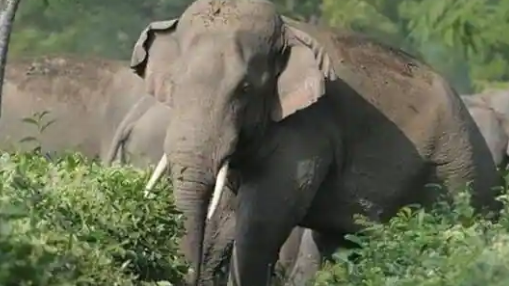In a tragic incident, a Border Security Force (BSF) officer was killed and a constable injured after an encounter with a herd of elephants in Meghalaya. The incident occurred near the India-Bangladesh border, underscoring the ongoing human-wildlife conflict in the region.
According to BSF officials, the officers were on a routine patrol in the South Garo Hills district when they were attacked by the elephants. Assistant Commandant Rajesh Kumar succumbed to his injuries at the scene, while Constable Vikram Singh was rushed to a nearby hospital with serious injuries. His condition is reported to be stable.
The patrol team encountered the herd while navigating a densely forested area, which is known for frequent elephant movements. “The elephants were likely startled by the presence of the patrol team, leading to the aggressive response,” explained a local wildlife expert.
This incident brings to light the challenges faced by security forces and local residents in areas with significant wildlife populations. The forests of Meghalaya, particularly in the Garo Hills, are home to a large number of elephants, and human-elephant conflicts have been a recurring issue.
“Human encroachment into elephant habitats and the search for food often bring these animals into close contact with people, leading to dangerous encounters,” said Dr Anupam Das, a wildlife conservationist. “There is an urgent need for strategies that can mitigate such conflicts to protect both human lives and wildlife.”
The BSF has expressed deep condolences to the family of Assistant Commandant Rajesh Kumar and has assured support for the injured constable. “This tragic loss highlights the unpredictable nature of duties performed by our personnel. We will review our patrol protocols in forested areas to prevent such incidents in the future,” stated a senior BSF official.
Local authorities and wildlife experts are calling for enhanced measures to manage human-wildlife interactions. Suggestions include the installation of early warning systems, increased patrolling in known elephant corridors, and community awareness programs to educate locals about safety practices.
The Meghalaya government has been working on various initiatives to reduce human-elephant conflicts. These include the creation of elephant corridors, relocation of affected communities, and the deployment of rapid response teams to handle wildlife emergencies.
“The safety of our people and the conservation of wildlife are both top priorities. We are committed to finding sustainable solutions that can reduce these tragic encounters,” said Meghalaya’s Chief Wildlife Warden.
As investigations into the incident continue, this tragedy serves as a sombre reminder of the delicate balance between human activities and wildlife conservation in India’s border regions.








 India
India












